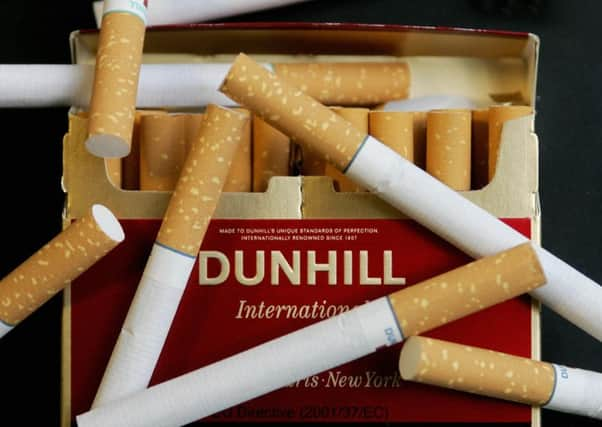Norman Stone: Nanny state's plan on back of a fag packet


She proved quite right just the same: Britain had to leave the ERM, and the euro has wreaked havoc, with much of southern Europe near bankruptcy.
She said at the time that the other EU leaders were “on their way to cloud cuckoo-land”. During the conference she produced a packet of Dunhill International on which a warning had been stamped: ‘Smoking seriously harms you and others around you’. She wondered how much bureaucratic time had been spent on this nonsense. Like us all, she knew many smokers who had lived to a ripe old age, and many non-smokers who had not. But what was the EU doing, bothering with such things?
Advertisement
Hide AdAdvertisement
Hide AdThe bureaucracy has grown and grown, now with a proposal to package all cigarettes in the same style. Already shops in the UK are forbidden to have cigarette packets on open sale; and they are also very expensive. But a quarter of adults smoke – an obstinate figure, not dented by the restrictions.
The nanny state is a multinational phenomenon. The World Health Organisation has no very obvious function and it needs international health scares so as to have something to do. How many times have we been told that this or that infection could spread, in the manner of the Black Death? Ebola has come and more or less gone. Bird flu caused tourists in Turkey to arrive with breathing masks, but it caused only one death –an eastern farmer who had sex with his neighbour’s hen and who was then killed by the neighbour.
Alcohol can be dangerous for health and national governments have to take charge of national circumstances; the Blair governments were badly advised to let the pubs stay open at will. In the UK there is a dreadful problem about public drunkenness and some sort of control has to be exercised. Those long winter nights drive people to drink. The same applies to Finland: creative and serious one minute, sozzled the next. This need not be used as a benchmark for international Prohibition, which may be nanny state’s next move.
Of course, there are very good reasons for advising smokers and drinkers of the dangers involved. The particular truths involved came up in a moment of deepest consequences – World War One. British pub hours were limited in 1915 because munitions workers flush with money got so drunk at weekends that they could not function on Monday mornings. Government realised that it had powers and for three generations British pubs closed at 11pm, or even earlier.
By then an idea had become widespread, that “the man in Whitehall knows best”. That idea led to widespread nationalisation of British industry, to the NHS and the introduction of universal comprehensive schooling – all of them with serious question marks. In the over-centralised UK reform became horribly difficult.
Suppose that it were possible for localities to decide for themselves as to whether smoking restrictions should be relaxed, or drink laws tightened. These matters have never been put to a vote, and that for a good reason, which in English history goes back a long way.
The Puritans are a very active and organised minority. They even can dictate what you say, and imprison or fine you if you speak your mind. There are good sides to the Puritans, of course. Around 1900, appalled by the mess of the slums of the great cities, town-planners of good will came up with the idea of a Garden City. However, Milton Keynes, one of these gnome-utopias, has a considerable crime rate and, from boredom, a drug problem.
The Puritans do not know what to do with this, though it is clearly far more important than tobacco or even alcohol. So they run away, and find yet sillier ways to stop smoking. They should either have the courage of their convictions, and ban it, with all the foreseeable consequences, or make sensible adaptations.
Norman Stone is an academic, historian and author, and is a former adviser to late prime minister Margaret Thatcher